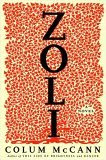> There is no story more exotic than a Gypsy tale. This one, loosely based on the life of Papusza, a Polish Gypsy singer and poet who died in 1987, spans seven decades and crosses national boundaries as freely as the Gypsy caravans once did. Primarily a reminiscence of Zoli Novotna, a poet born to a Romani family in Czechoslovakia, the novel also at times inhabits two other points of view: a Slovak journalist researching the mysterious Gypsy poet, and Stephan Swann, an Englishman who brought her work to the attention of a wider audience, thus earning for Zoli banishment by her people. It is the poet’s story that is most compelling—how she survived wartime persecution by the Nazi collaborators, how she moved from an oral to a written tradition, how she fled Czechoslovakia into Austria and later Italy after the Communists halted the caravans—and the author’s point of view and tense jumps are puzzling. Swann is complex, but naïve, self-indulgent and unsympathetic. The journalist is one-dimensional. Both provide the outsider’s view of Romani society, seeing its idiosyncrasies as the uninformed reader might, but add little to Zoli’s rich narrative. In fact, the most rewarding aspect of the book is its language. One recurring image in particular, the icy waters that signify both the death of Zoli’s family and her own rebirth in the West, is evocative of the whole of her experience. The final section of the book, in which Zoli visits her daughter in Paris, the hypothetical destination of her escape journey years earlier, is satisfying in that it allows Zoli a certain amount of closure, and crystallizes the old Gypsy legends into a harsher, 21st Century reality.
There is no story more exotic than a Gypsy tale. This one, loosely based on the life of Papusza, a Polish Gypsy singer and poet who died in 1987, spans seven decades and crosses national boundaries as freely as the Gypsy caravans once did. Primarily a reminiscence of Zoli Novotna, a poet born to a Romani family in Czechoslovakia, the novel also at times inhabits two other points of view: a Slovak journalist researching the mysterious Gypsy poet, and Stephan Swann, an Englishman who brought her work to the attention of a wider audience, thus earning for Zoli banishment by her people. It is the poet’s story that is most compelling—how she survived wartime persecution by the Nazi collaborators, how she moved from an oral to a written tradition, how she fled Czechoslovakia into Austria and later Italy after the Communists halted the caravans—and the author’s point of view and tense jumps are puzzling. Swann is complex, but naïve, self-indulgent and unsympathetic. The journalist is one-dimensional. Both provide the outsider’s view of Romani society, seeing its idiosyncrasies as the uninformed reader might, but add little to Zoli’s rich narrative. In fact, the most rewarding aspect of the book is its language. One recurring image in particular, the icy waters that signify both the death of Zoli’s family and her own rebirth in the West, is evocative of the whole of her experience. The final section of the book, in which Zoli visits her daughter in Paris, the hypothetical destination of her escape journey years earlier, is satisfying in that it allows Zoli a certain amount of closure, and crystallizes the old Gypsy legends into a harsher, 21st Century reality.
Zoli, by Colum McCann. Random House, January, 2007. $24.95
